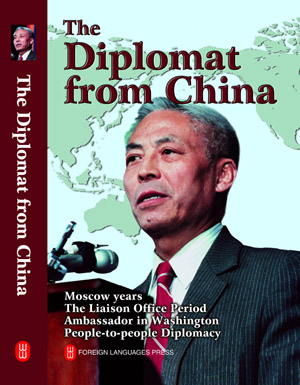By Chas Freeman
Ambassador Han Xu was a man of his times, and his times were the formative period of modern Chinese diplomacy and contemporary Sino-American relations. This is an account of the life of a popular, conscientious, and devoted Chinese patriot that can and will be read and appreciated at many levels by Americans and those outside China concerned with Sino-American relations, now that we can read it in English.
It will delight those readers who remember Han Xu as the earnestly upright, friendly, and competent diplomat he was. It will remind those readers who did not know him how very hard it was to achieve the present, mainly cooperative, Sino-American relationship. To still others, it will introduce the Chinese concepts of protocol, courtesy and consideration that Han Xu exemplified and that have become widely admired around the world.
This book is, at one level, a meticulous account of the professional life of one of Zhou Enlai's principal lieutenants, an enthusiastically fastidious public servant who helped at the tactical level to create the modern Chinese foreign ministry and its diplomatic style, manage both Indochina-focused Geneva conferences and the non-aligned summit at Bandung, cope with the era of Sino-American estrangement, assist at the birth of the Sino-Soviet split, set up Nixon's path-breaking visit to Beijing, achieve Sino-American normalization, open the Chinese liaison office in Washington, reach difficult post-normalization accommodations with Americans over the Taiwan issue, serve as China's ambassador to Washington in both the best and worst of times, and – as a final contribution to his country in official retirement -- broaden China's diplomatic ties globally.
Focused on Han Xu's role in all of these major developments in the diplomacy of the last quarter of the 20th century as well as in other, less well known events, this book provides important insights into how things looked to Chinese policy-makers and participants at the time. Its account of the Chinese handling of the run-up to President Nixon's China breakthrough is the most complete yet published. Its blow-by-blow account of the Sino-American normalization process and the Sino-Japanese antecedents this followed will come as a revelation to those who did not live through these events. Its account of the Chinese embassy's performance after the June 4th Incident in 1989 will evoke wry sympathy in any practitioner of crisis management or to ambassador who has had to cope with sharp foreign reactions to unexpected developments in his country and consequent setbacks to its relations with other countries and peoples.
At another level, this is the history of the personal and professional formation of a man who was a major figure in the early diplomacy of the People's Republic of China. The moving opening account of Han Xu's childhood and his subsequent rebellion against the autocratic and unbending father whose guidance he spurned but whom he came in some respects to resemble is the story of a generation of Chinese patriots who dropped out of university to join the communist-led fight against the Japanese and for social justice in their homeland. The numerous details of Han's interaction with Zhou Enlai (whose leadership in the formation of a distinctive Chinese diplomatic style cannot be overstated) and of his struggles to define rules and regulations for the practice of diplomacy by a completely unformed and inexperienced Chinese foreign ministry and diplomatic service provide invaluable insights into why China behaves as it does on the international stage.
Han's perplexity as the red guards of the "cultural revolution" sought to portray his meritorious service as subversive mirrored that of every dedicated civil servant in the Chinese system. Han's unflagging loyalty to the cause distinguishes him from many who found it all too Kafkaesque to be tolerated. And, no father who has given similarly of himself to his professional duties will avoid a wistful feeling when reading of Han Xu's enforced distance from his children and his beautiful and exquisitely refined wife (to whom this empathetic account of Han's life owes a great deal).
At still another level, this book provides interesting insights into the functioning of China's foreign ministry, Chinese interpretations (and misinterpretations) of the behavior of the ever inscrutable Americans at various points over the past thirty-five years, and the difficulties any ambassador has in dealing with a large, fickle democracy like the United States. But it should be read and will be enjoyed, most of all, for its dynamic portrayal of one of the late 20th century's most ingratiating professional diplomats, China's Han Xu, in the institutional and international settings in which he excelled.
(China.org.cn February 21, 2008)


